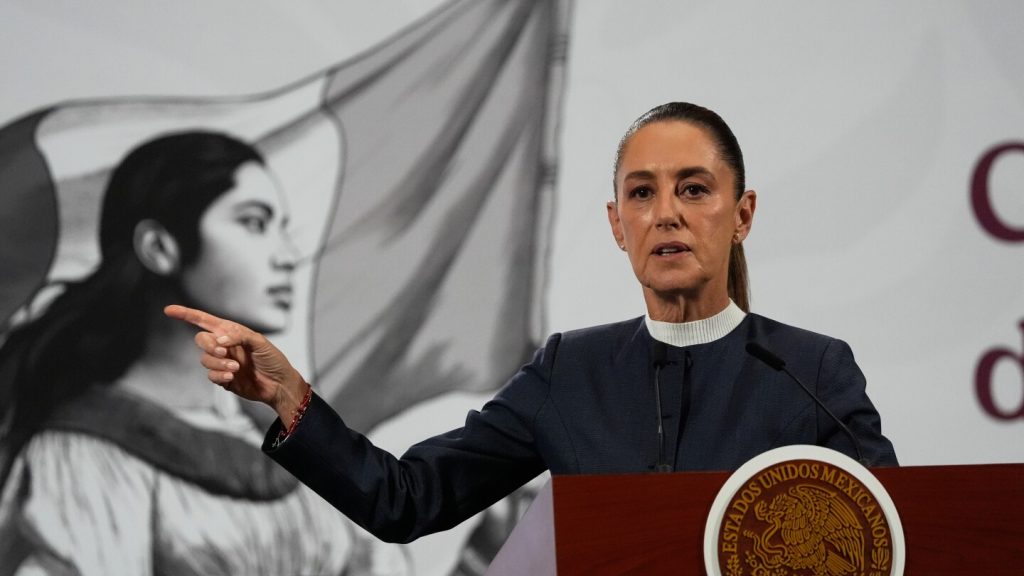Listen to the article
The public groping of Mexico President Claudia Sheinbaum on a downtown Mexico City street has illuminated the pervasive gender violence faced daily by Mexican women, yet political divisions have undermined what could have been a moment of national unity against sexual harassment, according to analysts.
Following the incident, which occurred while Sheinbaum was walking from the National Palace to the Education Ministry, the president has taken decisive action. She filed charges against the intoxicated perpetrator, advocated for standardizing sexual harassment laws across all Mexican states, and emphasized the need to streamline the reporting process for victims of such crimes.
“I want Mexican women to have a way to report that is agile, that is fast and that allows authorities to really do an investigation that leads to arrests,” Sheinbaum stated on Thursday while unveiling a comprehensive plan to improve government response to sexual abuse.
The timing of the assault, however, has sparked controversy. It occurred just days after Carlos Alberto Manzo Rodríguez, the mayor of Uruapan in the western state of Michoacan, was gunned down during Day of the Dead celebrations. The assassination triggered protests across Michoacan, with citizens demanding stronger security measures from the federal government.
Opposition politicians quickly suggested the assault on Sheinbaum was orchestrated to divert attention from the political violence plaguing Mexico. Senator Alejandro Moreno, leader of the opposition Institutional Revolutionary Party (PRI), while condemning violence against women, accused Sheinbaum’s Morena party of using the incident as a “political distraction” from the mayor’s murder.
“It could be a big setup to generate a distraction and so public opinion doesn’t keep talking about what it’s talking about, the assassinations, the administration’s narco-politics, the pact with organized crime,” Moreno claimed, without providing evidence.
The day before her assault, Sheinbaum had announced a new security strategy for Michoacan that included deploying additional troops while addressing root causes of violence. This timing fueled opposition skepticism, though analysts note the fragility of Mexico’s opposition parties.
Political consultant Javier Rosiles Salas observed that “this country’s opposition is weak” and struggling against the administration’s powerful narrative, which has only strengthened Sheinbaum’s already considerable popularity.
Ricardo Anaya, former presidential candidate of the National Action Party (PAN), questioned the government’s security protocols, saying, “If they can’t take charge of the president’s security, how are they going to secure the country?”
The criticism directed at Sheinbaum mirrors the experiences of countless Mexican women who face skepticism and blame when reporting sexual crimes. María de la Luz Estrada, director of the National Citizen Observatory on Femicide, characterized the political response as “a high-profile example of how women who suffer such assaults are revictimized by authorities.”
“It’s always about disparaging and not trying to understand what happened,” Estrada explained, noting that many women don’t report sexual crimes because police and prosecutors often dismiss their accounts or subject them to intrusive questioning.
Ceci Flores, who leads a collective for families of disappeared persons, commented bitterly on social media: “Our president only needed a few meters outside the palace to become a victim. That’s the Mexico that we all walk every day: if we’re lucky it’s assault, if we’re not they kill or disappear us.”
The assault has spotlighted Mexico’s persistent issues with gender violence. Despite Sheinbaum’s efforts to use her experience to drive positive change through legislative reform and public awareness campaigns, political polarization has undermined what could have been a unifying national conversation about protecting women from harassment and assault.
Following the incident, Sheinbaum met with Manzo Rodríguez’s widow at the National Palace, who was subsequently sworn in to complete her late husband’s term as mayor—a demonstration of the president’s attempt to address both gender violence and political violence simultaneously in a country where both remain critical challenges.
Fact Checker
Verify the accuracy of this article using The Disinformation Commission analysis and real-time sources.




6 Comments
Prioritizing women’s safety and security should be a non-partisan issue. I hope this leads to tangible improvements in how sexual harassment and assault are addressed in Mexico.
This is a complex issue with political tensions. While the groping incident highlights the pervasive problem, a united, non-partisan approach would be ideal to truly drive change.
Agreed. Keeping the focus on victim support and meaningful reform, rather than partisan politics, will be key.
Addressing gender violence is critical, though the timing of this incident raises some concerns. Streamlining the reporting process and improving government response are important steps forward.
Streamlining the reporting process is a good step, but deeper cultural change is needed to address the root causes of gender violence in Mexico. This will require a sustained, multi-faceted effort.
While the timing may be controversial, using this incident to drive reform is commendable. Improving government response and accountability around sexual crimes is crucial for protecting women’s rights.